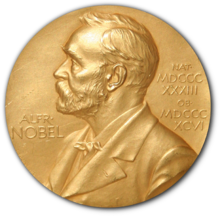Nobel Prize in chemistry
| The Nobel Prize in Chemistry | |
|---|---|
 |
|
| Awarded for | Outstanding contributions in chemistry |
| Location | , Sweden |
| Presented by | Royal Swedish Academy of Sciences |
| First awarded | 1901 |
| Most awards | Frederick Sanger (2) |
| Official website | nobelprize.org |
|
|||||||||||||
|
|||||||||||||
|
"for the design and synthesis of molecular machines" |
|||||||||||||
|
|||||||||||||
Tomas Lindahl
Paul L. Modrich
Aziz Sancar
(2015)
Jean-Pierre Sauvage
J. Fraser Stoddart
Ben Feringa
(2016)
The Nobel Prize in Chemistry (Swedish: Nobelpriset i kemi) is awarded annually by the Royal Swedish Academy of Sciences to scientists in the various fields of chemistry. It is one of the five Nobel Prizes established by the will of Alfred Nobel in 1895, awarded for outstanding contributions in chemistry, physics, literature, peace, and physiology or medicine. This award is administered by the Nobel Foundation and awarded by Royal Swedish Academy of Sciences on proposal of the Nobel Committee for Chemistry which consists of five members elected by Academy. The award is presented in at an annual ceremony on December 10, the anniversary of Nobel's death. The first Nobel Prize in Chemistry was awarded in 1901 to Jacobus Henricus van 't Hoff, of the Netherlands, "for his discovery of the laws of chemical dynamics and osmotic pressure in solutions."
Alfred Nobel stipulated in his last will and testament that his money be used to create a series of prizes for those who confer the "greatest benefit on mankind" in physics, chemistry, peace, physiology or medicine, and literature. Though Nobel wrote several wills during his lifetime, the last was written a little over a year before he died, and signed at the Swedish-Norwegian Club in Paris on 27 November 1895. Nobel bequeathed 94% of his total assets, 31 million Swedish kronor (US$198 million, Euro€176 million in 2016), to establish and endow the five Nobel Prizes. Due to the level of skepticism surrounding the will, it was not until April 26, 1897 that it was approved by the Storting (Norwegian Parliament). The executors of his will were Ragnar Sohlman and Rudolf Lilljequist, who formed the Nobel Foundation to take care of Nobel's fortune and organise the prizes.
...
Wikipedia



